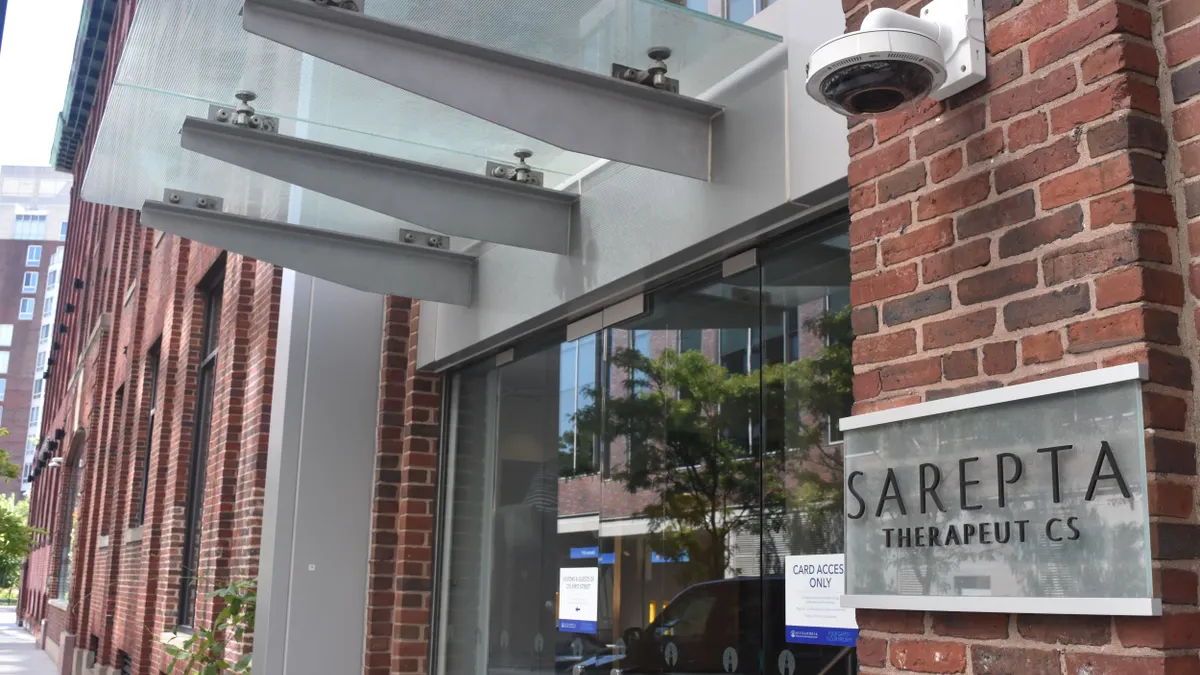Sarepta Therapeutics is laying off roughly 500 employees in an extensive workforce reduction that follows a series of setbacks and the collapse of the company’s share price this year.
In a statement Wednesday, Sarepta said it plans to cut approximately 36% of its staff and pause research on several drug programs. The company expects the two moves together will result in more than $400 million in annual cost savings in 2026.
On a conference call held Wednesday afternoon, Sarepta CEO Doug Ingram said that "failure to adapt" to recent setbacks "would risk our long-term viability as an organization and decrease the opportunity to bring the greatest benefit to the greatest number of patients living with rare disease."
Sarepta employed 1,372 people as of the end of last year, according to a regulatory filing. Shares in the company rose in after-hours trading on the news.
For Sarepta, the layoffs reflect, in part, uncertainty around the future of Elevidys, its gene therapy for Duchenne muscular dystrophy. Elevidys is the product of many years of research into the deadly neuromuscular condition and, in 2023, became the first and currently only gene therapy for the disease approved in the U.S.
The Food and Drug Administration’s clearance was controversial. While Elevidys initially won approval for a narrow group of patients, the agency expanded its OK the following year even though study results were mixed and left the therapy’s ultimate benefits unclear.
But the broader OK sent Sarepta’s share price soaring and demand for Elevidys climbing. Some Wall Street analysts predicted sales might top $2 billion in 2025.
However, in March and in June, Sarepta disclosed two Elevidys-treated patients died after experiencing acute liver failure. The individuals were older and could no longer walk because of their disease’s progression.
In response, Sarepta stopped selling the treatment to these older, non-ambulatory patients, who it judges are at higher risk of treatment-induced liver damage. The company also paused a study meant to confirm Elevidys’ benefits in these patients, and convert the therapy’s current “accelerated” approval in these patients to a traditional one.
Sarepta is working on a new regimen of immune-suppressing drugs to manage the safety risks, and plans to soon share its findings with the FDA.
Sarepta has suspended its financial forecasts in the meantime. The company’s share price is lower by more than 80% this year amid concerns about Elevidys’ future and the chance new FDA leadership might restrict its use. The company also has $1 billion in senior notes coming due in 2027.
Ingram had hinted cuts could be coming on a conference call in June “We’re going to have to look at our cost structure to make sure that we remain financially disciplined,” he told analysts then.
Sarepta became profitable in 2024, and believes it can stay in the black even if Elevidys only draws revenue from ambulatory patients, executives said on that June call.
On Wednesday, Sarepta shared that the FDA is adding a black box warning about the risk of liver failure or injury to Elevidys’ label, which Sarepta said should resolve any agency concerns with the therapy’s use in that group.
However, "more dialogue is required” with the FDA about Elevidys’ use in non-ambulatory patients, Ingram said on the Wednesday call.
Sales of the gene therapy were approximately $282 million in the second quarter, Sarepta disclosed Wednesday, lower than the $375 million it recorded the first quarter. The company believes sales in ambulatory patients are likely to annualize at a minimum of $500 million annually through 2027.
Three other “exon-skipping” drugs Sarepta sells for Duchenne could bring in about $900 million per year over that period, the company added.
Sarepta also has a gene therapy for limb-girdle muscular dystrophy it plans to submit for approval later this year, too, although it is pausing research on other treatments for that condition.
Aside from the Duchenne medicines it sells, Sarepta intends to focus resources moving forward on a group of RNA-based medicines it’s developing with Arrowhead Pharmaceuticals. Among them are treatments for spinocerebellar ataxia, Huntington’s disease and facioscapulohumeral muscular dystrophy. In its statement, Sarepta said those drugs have “tremendous near-term potential.”
Editor’s note: This story has been updated with additional details and commentary from Sarepta executives.














